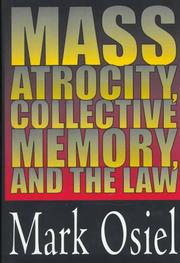| Listing 1 - 2 of 2 |
Sort by
|

ISBN: 1560003227 0765806630 9780765806635 9781560003229 9780203786154 9781351506663 9781138527720 Year: 2000 Publisher: New Brunswick, N.J. Transaction
Abstract | Keywords | Export | Availability | Bookmark
 Loading...
Loading...Choose an application
- Reference Manager
- EndNote
- RefWorks (Direct export to RefWorks)
Trials of those responsible for large-scale state brutality have captured public imagination in several countries. Prosecutors and judges in such cases, says Osiel, rightly aim to shape collective memory. They can do so in ways successful as public spectacle and consistent with liberal legality. In defending this interpretation, he examines the Nuremburg and Tokyo trials, the Eichmann prosecution, and more recent trials in Argentina and France. Such trials can never summon up a "collective conscience" of moral principles shared by all, he argues. But they can nonetheless contribute to a little-noticed kind of social solidarity. The approach Osiel advocates requires courts to confront questions of historical interpretation and moral pedagogy generally regarded as beyond their professional competence. It also raises objections that defendants' rights will be sacrificed, historical understanding distorted, and that the law cannot willfully influence collective memory, at least not when lawyers acknowledge this aim. Osiel responds to all these objections, and others. Lawyers, judges, sociologists, historians, and political theorists will find this a compelling contribution to debates on the meaning and consequences of genocide. To this end, writes Osiel, we should pay closer attention to the way an experience of administrative massacre is framed within the conventions of competing theatrical genres. Defense counsel will tell the story as a tragedy, while prosecutors will present it as a morality play. The judicial task at such moments is to employ the law to recast the courtroom drama in terms of a "theater of ideas," which engages large questions of collective memory and even national identity. Osiel asserts that principles of liberal morality can be most effectively inculcated in a society traumatized by fratricide when proceedings are conducted in this fashion.
Human rights --- Law of armed conflicts. Humanitarian law --- Collectieve verantwoordelijkheid. --- Ethische vorming. --- GENOCIDE. --- LAW. --- MORAL ASPECTS. --- Memoria --- Moraal. --- SOCIOLOGY. --- TRIALS. --- Tribunalen. --- WAR CRIMES. --- Genocide. --- HISTORY. --- Memory --- Twentieth century. --- War crime trials --- Aspectos sociales. --- Social aspects. --- Moral and ethical aspects.
Book
ISBN: 9781503609594 9780804794114 0804794111 1503609596 150360960X 9781503609600 Year: 2019 Publisher: Stanford, California : Stanford University Press,
Abstract | Keywords | Export | Availability | Bookmark
 Loading...
Loading...Choose an application
- Reference Manager
- EndNote
- RefWorks (Direct export to RefWorks)
When it comes to historical violence and contemporary inequality, none of us are completely innocent. We may not be direct agents of harm, but we may still contribute to, inhabit, or benefit from regimes of domination that we neither set up nor control. Arguing that the familiar categories of victim, perpetrator, and bystander do not adequately account for our connection to injustices past and present, Michael Rothberg offers a new theory of political responsibility through the figure of the implicated subject. The Implicated Subject builds on the comparative, transnational framework of Rothberg's influential work on memory to engage in reflection and analysis of cultural texts, archives, and activist movements from such contested zones as transitional South Africa, contemporary Israel/Palestine, post-Holocaust Europe, and a transatlantic realm marked by the afterlives of slavery. As these diverse sites of inquiry indicate, the processes and histories illuminated by implicated subjectivity are legion in our interconnected world. An array of globally prominent artists, writers, and thinkers-from William Kentridge, Hito Steyerl, and Jamaica Kincaid, to Hannah Arendt, Primo Levi, Judith Butler, and the Combahee River Collective-speak to this interconnection and show how confronting our own implication in difficult histories can lead to new forms of internationalism and long-distance solidarity.
Agent (Philosophy). --- Collective memory. --- Responsibility. --- Responsibility --- Agent (Philosophy) --- Collective memory --- Agency (Philosophy) --- Agents --- Person (Philosophy) --- Act (Philosophy) --- Philosophy --- Collective remembrance --- Common memory --- Cultural memory --- Emblematic memory --- Historical memory --- National memory --- Public memory --- Social memory --- Memory --- Social psychology --- Group identity --- National characteristics --- Accountability --- Moral responsibility --- Obligation --- Ethics --- Supererogation --- #KVHA:Collectief geheugen --- #KVHA:Collectieve verantwoordelijkheid --- #KVHA:Politieke verantwoordelijkheid --- Political philosophy. Social philosophy --- Holocaust. --- bystander. --- complicity. --- internationalism. --- memory. --- perpetrator. --- responsibility. --- solidarity. --- victim. --- violence.
| Listing 1 - 2 of 2 |
Sort by
|

 Search
Search Feedback
Feedback About
About Help
Help News
News